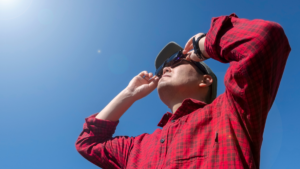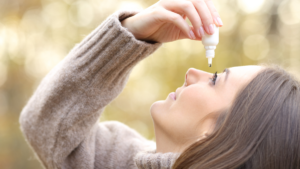Visual impairment (low vision) may be defined as insufficient vision to do the things a person wants and needs to do. The loss of vision cannot be corrected by regular glasses, medical treatment, or surgery and can be congenital or the result of disease, and injury.
Common eye diseases that cause low vision may include macular degeneration, glaucoma, diabetic retinopathy and inherited retinal disease. These conditions can cause a permanent loss of central (detailed) vision, as well as a loss of peripheral (side) vision. People may have difficulty reading the newspaper, paying bills (even with reading glasses), recognizing faces, crossing streets, and seeing small print on their television.
Low vision care (also referred to as Vision Rehabilitation) helps people with low vision function as fully and independently as possible by providing devices, information, and technology.
Step 1: Get an Eye Exam With an Eye Care Professional
A thorough eye examination is imperative to diagnose the reason for your decrease in vision. The eye doctor will ensure you:
- are evaluated for ocular and systemic disease
- receive proper medical treatment for your eye disease
- have the best eye glass prescription possible
Due to the underlying eye disease, new glasses cannot restore vision to a level that allows you see detail (small & fine print, faces, etc.) like you did before. Your eye care professional may refer you to an optometrist specializing in low vision care. You can also request a referral for low vision rehabilitation, if you are having difficulty performing your daily activities.
Step 2: Discuss With Your Eye Doctor the Need for a Low Vision Evaluation
A low vision exam with an optometrist specializing in low vision care, takes about one to two hours and is different than a typical eye exam. The low vision evaluation will focus on how you function with your remaining vision and find strategies to maximize your remaining vision.
Use the time during your low vision exam to discuss and understand your vision goals and challenges. For example, improving facial recognition, writing, reading, color identification, and more. Bring any current glasses, magnifiers, or other low vision devices you use, whether they are helpful or not.
Step 3: Discuss How to Make Reading Easier
A conversation about how to make reading with low vision easier can produce great results. Your low vision specialist can make suggestions on how to improve reading for your specific needs and uses. For instance, a student might require a way to read notes on a whiteboard while in class and you can troubleshoot the challenges around this together.
Basic Modifications for Reading:
- Increase lighting.
- Use of increased magnification such as stronger reading glasses, hand-held and stand magnifiers, hand-held and spectacle mounted telescopes, and electronic video magnifiers.
- Use of auditory and large print accessibility features on your smartphone, tablet and desk-top computers.
- Use of audiobooks through the National Library of Congress Talking Book program.
Step 4: Discuss How to Improve Quality of Life at Home/Work
Your eye doctor may refer you to a:
- Certified Vision Rehabilitation Teacher
- Occupational Therapist who specializes in working with the visually impaired
- Certified Orientation and Mobility Specialist
These professionals work with you in your home, community, and workplace to ensure safety and independence.
Obtaining additional strategies and modifications are critical for maintaining independence. Adjustments and organizational practices can make a huge difference. The following techniques are commonly offered, but this is also your chance to troubleshoot any current issues arising at home or work:
- Improve over-head and task lighting. Consistent lighting at home can reduce the risk of falls and disorganization.
- Use contrasting colors to help identity steps, railings, knobs, switches, and anything else that is difficult to detect visually.
- Remove hazards like rugs, cords, bulky furniture, or anything that could cause a fall or injury.
- Use large print labels and tactile dots to help identify objects, numbers on the oven or microwave, telephone, remote control, and computer keyboard.
- Create an organizational system to keep track of personal items.
- Label medications or use a color code system for identifying prescription and over the counter medications.
- Troubleshoot any challenges that prevent access to a healthy diet high in nutrient dense foods like leafy greens, berries, fish, nuts, and more.
Colorado Resources and Support Services Specific to Blindness/Visual Impairment
- A Shared Vision: Partners in Pediatric Visual Impairment
- Anchor Center for Blind Children
- Audio Information Network of Colorado
- Colorado Association of the Education and Rehabilitation of the Blind and Visually Impaired (CAER) Chapter
- Colorado Center for the Blind Youth Programs
- Colorado Talking Book Library
- Colorado School for the Deaf and the Blind
- Learning Ally
- University of Northern Colorado’s teacher training program in Visual Impairment, which includes coursework in “Orientation and Mobility“
National Resources
- AERBVI – Association for Education and Rehabilitation of the Blind and Visually Impaired
- ACB – American Council of the Blind
- ACVREP – Academy for Certification of Vision Rehabilitation and Education Professionals
- AFB – American Foundation for the Blind
- APH– The American Printing House for the Blind, Inc.
- BANA– Braille Authority of North America
- CEC – Division on Visual Impairment of the Council for Exceptional Children
- COSB – Council for Schools for the Blind
- LI – Lighthouse International
- NBA – National Braille Association
- NFB – National Federation of the Blind
- RRTC – Rehabilitation Research & Training Center on Blindness and Low Vision
- USABA – United States Association for Blind Athletes
Scholarship Information
- SEE THE FUTURE FUND Scholarship Application
This application is for Colorado students who are blind/visually impaired and who are pursuing education beyond high school (certificate (E.g.: massage Therapy), Community College, 4 year college or university, and graduate school. - American Foundation for the Blind
- Blinded Veterans Association
- Lighthouse International
- National Federation of the Blind
- National Federation of the Blind of Colorado
Colorado Low Vision Specialists
Aurora | Kara Hanson, OD, FAAO | 720-848-2020 | UCH-Sue Anschutz Rodgers Eye Center 1675 Aurora Ct |
Aurora | David Lewerenz, OD, FAAO Clinical Diplomate in Low Vision, American Academy of Optometry | 720-848-2020 | UCH-Sue Anschutz Rodgers Eye Center 1675 Aurora Ct |
Aurora | Dr. David Simpson | 720-848-2020 | UCH-Sue Anschutz Rodgers Eye Center 1675 Aurora Ct |
Aurora | Shannon Kessler, OD, FAAO | 303-283-5386 | VA Eastern CO Healthcare System |
Bayfield | Brian Meier, OD | 970-884-2020 | 49 W. Mill Street |
Brush | George Hertneky, OD | 970-842-5166 | 212 Cameron St |
Centennial | Eddy Najjar, OD | 720-389-8023 | 7500 South University Blvd., Unit 104 |
Craig | Craig Eckroth, OD | 970-824-3488 | 450 Pershing St., Suite 100 |
Colorado Springs | Dr. Gregg Pusateri | 719-471-3200 | 5614 N Union Blvd |
Colorado Springs | Margaret “Molly” Dixon, OD, FAAO | 719-599-2020 | 320 E. Fontanero, #201 |
Fort Collins | Deanna Alexander, OD, FAAO | 970-221-4811 | 702 W Drake Rd, Bldg B |
Glenwood Springs | Jennifer Zwelling, OD, FAAO | 970-945-2020 | Valley Vision 904 Pitkin Ave, Glenwood Springs, CO 81601 |
Lakewood | Dale Lervick, OD, FAAO | 303-233-7575 | 7586 W Jewell Ave # 104 |
Lakewood | Kirk Matoba, OD | 303-988-2777 | 200 N. Union Blvd |
Lakewood | Neuro-Sight Vision Care – Drs. Jarvis, Politzer, and Chonka | 303-989-2020 | 333 S Allison Pkwy # 120, Lakewood, CO 802226 |
Lakewood | Meredith Schneider, OD | 720-793-0487 | Denver Vision Inc |
Lakewood | Dr. Alex Zemke | 303-238-9900 | 2290 Kipling St Unit 1 |
Steamboat Springs | Craig Eckroth, OD | 970-879-2020 | 365 Anglers Dr Suite A |

Kick Start Your New Year’s Resolution with Your Eye Health!
Now is a great time to get a head start on your New Year’s resolution! What better way to care for your health than starting

Vision Awareness Patch Program
Girl Scout leaders have you heard? There is now an eye health patch that your Girl Scout troop can earn! The Colorado Optometric Association and

Eye Health and Sport Safety
Summer is nearly here, and kids are excited to go out and play! But with this we need to ensure that their eyes and vision

Are Your Eyes Ready for the Upcoming Total Solar Eclipse?
A total solar eclipse¹ will cross the United States on April 4, 2024, passing over Texas, and traveling through Oklahoma, Arkansas, Missouri, Illinois, Kentucky, Indiana, Ohio,

The Time Has Come to Use Your Health Benefits!
Have you made good use of your health benefits this year? If not, consider using your Health Savings Accounts (HSA) or Flexible Spending Accounts (FSA)

Winter is Coming – So Are Dry Eyes
Brace yourselves, winter is coming and so are dry eyes! Winter weather conditions are one of the leading causes for dry eye symptoms. This is